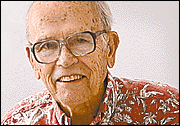Advertisement - Click to support our sponsors.


Hawaii’s World
SCIENTIFIC and technological advance shouldn't be halted but should be harnessed. This is the message I carry away from last month's East-West Philosophers' Conference held here under the auspices of the University of Hawaii and East-West Center. East meets West
at philosophers’
conferenceAn addendum to my first statement would be that scientific and technological progress probably CAN'T be halted but it could be slowed by bans and the withdrawal of funding. Woe to the country that does this, however. Others will pick up and leave it behind. North Korea is the saddest example.
Passions were high at a session I attended on globalization and cyberspace. Critics blamed worldwide capitalism, its focus on profits, and the added strength given it by the Internet for the exploitation of Third World countries -- environmental desecration, slave wages in Asia, 15 million impoverished children in Brazil.
The presenter that night was Mehroo Jussawalla of the emeritus faculty at the East-West Center. Small she is, but she came roaring back to note that India, her birthplace, once kicked IBM out of its country as an exploiter but invited it back for the investment it can bring and the food it can put on the tables of India's poor. She had similar examples from other countries.
A much-honored expert on global communication, Jussawalla said the network TV showings of New Year 2000's hourly arrivals around the world showed that we truly have become the global village predicted decades ago by futurist Marshall McLuhan. We saw people and faces around the world with a clarity we once could not have achieved between Waikiki and Waianae.
I buy into her contention that the task of policy makers should be to harness technological progress for the common good and its potential to improve living standards for even the poorest people of our globe.
Philosophers challenged propositions with great passion at the conference here yet seemed to maintain a basic respect for each other.
They may even modify their own views based on the arguments they heard. And they may feed ideas into public forums in their respective countries in ways that ultimately can affect public thought and national policies. They help us to deeper understandings of life's complexities, as with cloning, a topic here.
WHEN the first East-West Philosophers' Conference was held at the UH in 1939, there was hope of developing a commonly accepted universal philosophy. No more. Cultural and national differences, we now know, are too strong for that to happen. A session on transplants from brain-dead persons, for example, illuminated strong East-West differences.
But we can gain just from better understanding each other's cultures. Being a good citizen in the global village practically demands that.
It forces multinational companies to be sensitive to these differences. It often can be used to extract concessions from multinationals to do business in various countries on terms that are more helpful than exploitative. I assume India pressed such terms on IBM before allowing it to return.
If a five-year cycle is maintained, the ninth conference will be in 2005. No central topic has been chosen, as technology and human values was this year, but a strong contender, may be food with its philosophical underpinnings.
A.A. Smyser is the contributing editor
and former editor of the the Star-Bulletin
His column runs Tuesday and Thursday.